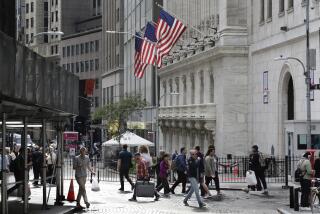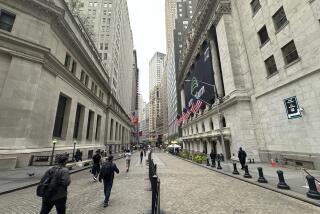IMPACT OF THE GULF WAR : Q&A; : Weigh Risks Before Jumping on the Market Bandwagon
- Share via
With stock, bond and commodities markets going wild after the allied strike against Iraq, many investors are wondering what to do. Jump on the bandwagon and buy stocks and bonds? Play the contrarian and sell? Or sit this one out?
There are no easy answers. But the first step in making an informed decision is to try to make sense amid the confusion.
Question: What exactly happened in U.S. financial markets Thursday?
Answer: The Dow Jones industrial average--which measures the value of 30 blue chip stocks--rose a stunning 114.60 points, gold prices fell more than $30 an ounce and oil prices posted a record one-day loss. Bond prices rose precipitously.
Q: Why did markets react the way they did?
A: Many investment experts attributed the activity to a surprisingly successful first strike against Iraq. Although most analysts believed the U.S. would eventually prevail in a war against Iraq, they worried this could be a long, costly war.
That could mean bad news for the U.S. budget deficit, interest rates and economic growth. The scope and apparent success of Wednesday night’s operation caused many investors to believe the war could be won quickly, restoring stability to financial markets.
Q: Will the markets continue to behave that way?
A: They will likely remain volatile as long as the fighting continues and the direction they head could change depending on the course of the war.
Q: Why did the value of gold and the U.S. dollar fall along with oil prices on some markets Thursday?
A: Gold and the dollar generally are considered safe havens in uncertain times. They fell on news of the allied air strikes, but could rise again if events shift against the allied forces.
Q: What can we expect in the long term for investments?
A: If oil prices continue to fall, it could give a big boost to the U.S. economy and, in turn, bolster stock and bond prices. But it is too early to predict where oil prices eventually will settle.
Q: What’s next?
A: This is the question that stymies amateurs and professionals alike. Generally, though, many believe that the markets will continue to fluctuate with the latest developments in the Persian Gulf. If the war continues to go well for the allies, stocks and bond prices could rise further and commodity prices may further deteriorate. If, however, the battle draws out, expect the opposite reaction.
Q: What are the risks?
A: Political instability in the Mideast is likely to make the markets highly volatile for some. This makes smart investing difficult. Don’t forget the U.S. economy still has serious problems. It’s suffering from a recession marked by rising unemployment and lackluster consumer spending. Moreover, consumers, corporations and the government have been on a 10-year spending spree, largely financed by debt. It remains to be seen whether these debt levels will prove crushing and cause long-term economic woes. Some believe the government will have to keep interest rates high to finance its $3-trillion deficit. Taxes could also rise. And consumers--hamstrung by high interest rates, high taxes and their past excesses--may keep spending at a minimum. That bleak scenario could depress investment values for some time.
Q: What should I do?
A: Examine your investment portfolio and your objectives. Do you have investments that are worth more now than when you bought them? If so, you might think about selling to lock in profits. On the other hand, if you are still confident about the reasons that you chose your investments and you don’t feel any of those factors have suddenly changed, you might be wise to hold tight. With such volatility in the markets, there are always fortunes to be made--and lost. Speculators beware!
More to Read
Inside the business of entertainment
The Wide Shot brings you news, analysis and insights on everything from streaming wars to production — and what it all means for the future.
You may occasionally receive promotional content from the Los Angeles Times.










